Pueblos de Yucatán
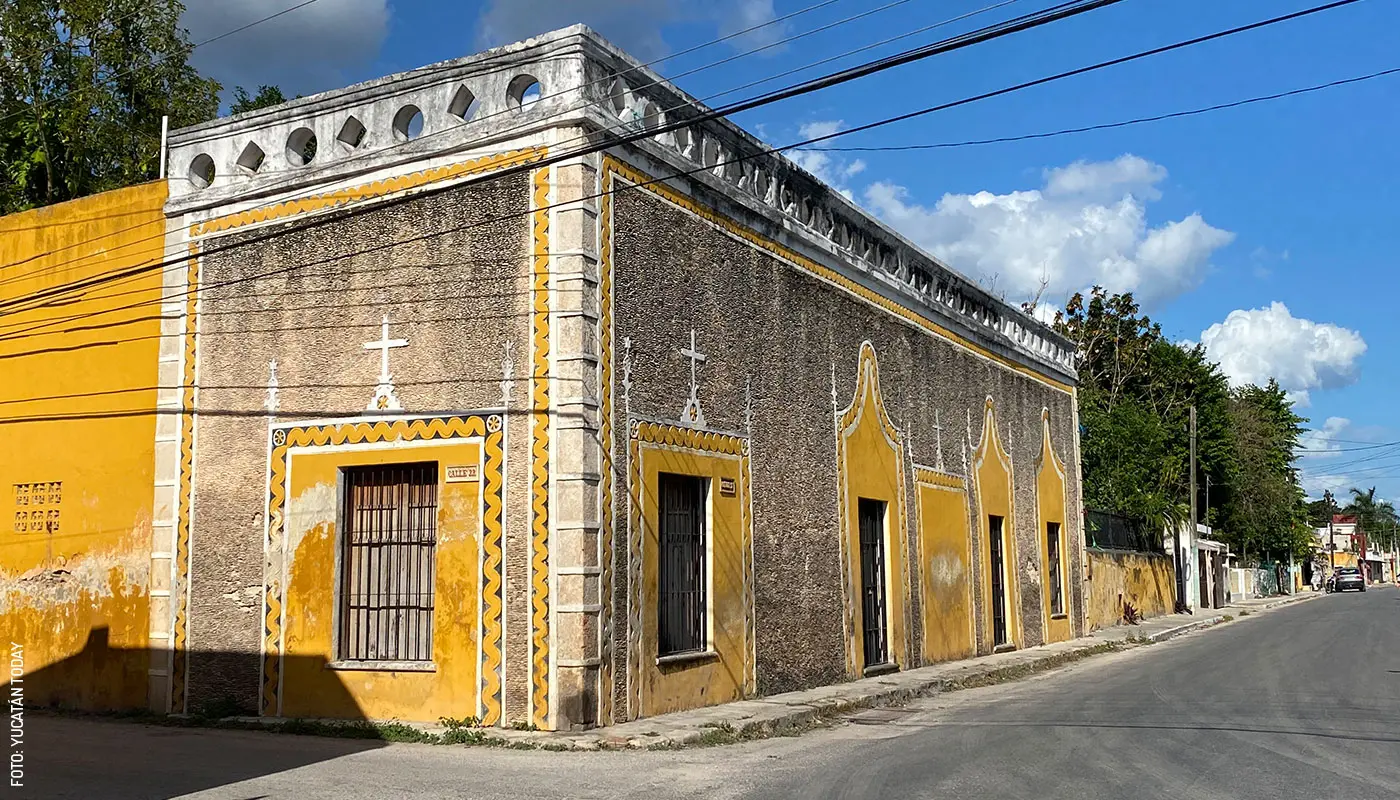
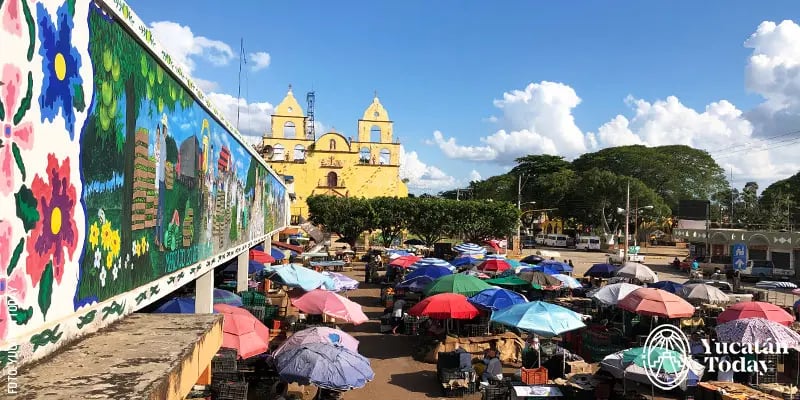
Los siete pueblos mágicos de Yucatán
Para muchos, México (y gran parte de América Latina) emana un ambiente único que sólo puede describirse como realismo mágico. En este sentido, en 2001, los responsables de la Secretaría de Turismo de México diseñaron un programa por el que un pueblo o ciudad pequeña puede recibir una designación especial como lugar «mágico». De ahí el término de Pueblo Mágico. Se trata de lugares en todo el país que tienen ese «algo” especial, ya sea cultura, comida, ubicación física o tradiciones locales únicas que los hacen muy atractivos para los visitantes. La idea es no sólo promover estos lugares, sino mantenerlos mágicos y restaurarlos con una inyección de fondos federales, estatales y municipales.
El estado de Yucatán tiene muchos lugares que yo consideraría mágicos, pero sólo unos cuantos son reconocidos oficialmente como Pueblos Mágicos.
Algunas características que tienen en común son:
Casas y negocios recién pintados y coloridos
Las fachadas de los edificios en el centro de cada poblado han sido totalmente restauradas y pintadas, creando un paseo fotogénico por las calles que rodean la plaza principal. ¡Siempre ten a mano tu cámara o teléfono!
Ausencia de cables eléctricos visibles
Al pasear por cualquier barrio y, sobre todo, por el centro de prácticamente todas las ciudades y pueblos de México, verás en el cielo una maraña de cables eléctricos y líneas de alta tensión, mezclados con las tradicionales líneas telefónicas y de fibra óptica e incluso líneas de televisión por cable. En los Pueblos Mágicos estos cables han desaparecido; su ausencia es liberadora y hace que las fotos sean mucho mejores.
No hay señalizaciones chillonas
Toda la señalización está estrictamente controlada y regulada. Nada de cartulinas rosa fluorescente con letras torcidas escritas con marcadores anunciando las ofertas. Nada de neones horribles. Incluso las omnipresentes tiendas Oxxo tienen una señalización discreta y menos intrusiva que sus homólogas urbanas no-mágicas.
Éstos son los Pueblos Mágicos de Yucatán junto con un poco sobre cada uno.
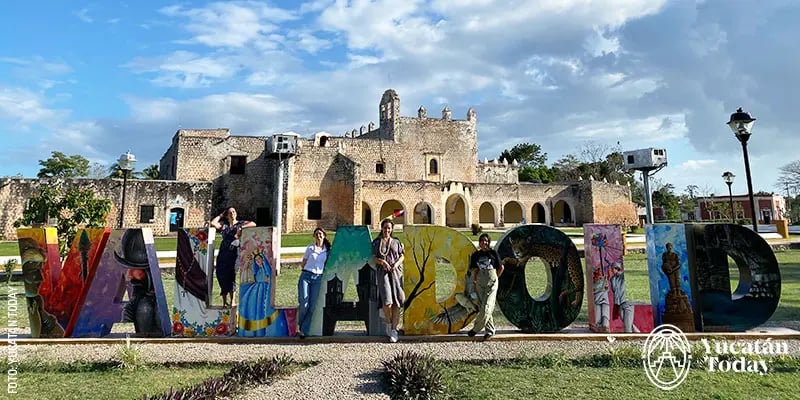
Situada a la mitad del camino entre Mérida y Cancún, Valladolid, fue nombrado «Pueblo Mágico», en agosto de 2012, es una pintoresca ciudad colonial con barrios de gran majestuosidad y belleza por lo que desde 1823 ha sido nombrada La Sultana de Oriente. Título merecido por la belleza arquitectónica de sus edificaciones coloniales.Valladolid fue fundada por Don Francisco de Montejo “El Mozo” en 1543 y adquirió la categoría de ciudad en 1823. Valladolid es el lugar donde sucedieron dos grandes pasajes de la historia de México: la Guerra de Castas en 1847 y la primera chispa de la Revolución Mexicana en 1910, misma que celebran cada año el 4 de junio con diferentes festejos deportivos y culturales.
En la primavera del 2012, Valladolid fue decretada Zona de Monumentos a nivel federal. Hay 7 barrios, cada uno con su iglesia que se debe de visitar y el cenote Zací que está a unas cuadras de la plaza.
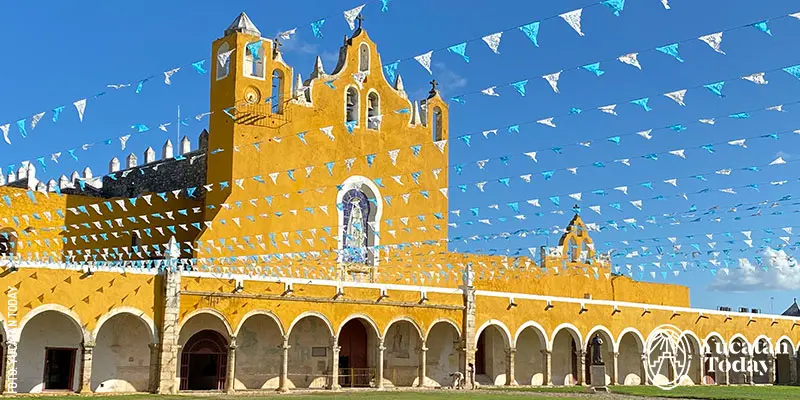
El Pueblo Mágico de Izamal es conocido en Yucatán como la Ciudad de los Cerros. Se dice que esto es debido a que, por mucho tiempo, las construcciones mayas que en ella se encuentran estaban en tal grado de abandono que aparentaban ser pequeñas colinas.
Por otro lado, la convivencia de estos vestigios mayas con construcciones coloniales (como el convento de San Antonio de Padua) y, desde luego, la vida del México moderno, le han dado a Izamal un segundo sobrenombre: la Ciudad de las Tres Culturas.
Su tercer “apodo” es la Ciudad Amarilla, y no es difícil ver por qué: toda la ciudad se encuentra pintada de ese alegre color. Las leyendas sobre por qué esto es así abundan; lo cierto es que en Izamal las fachadas de las casas son amarillas desde la década de 1960, y que el tono de amarillo se estandarizó en 1993, coincidiendo con la visita del papa Juan Pablo II a esta ciudad.
¿Quieres saber más? Tenemos un artículo con todo lo que necesitas saber sobre Izamal.
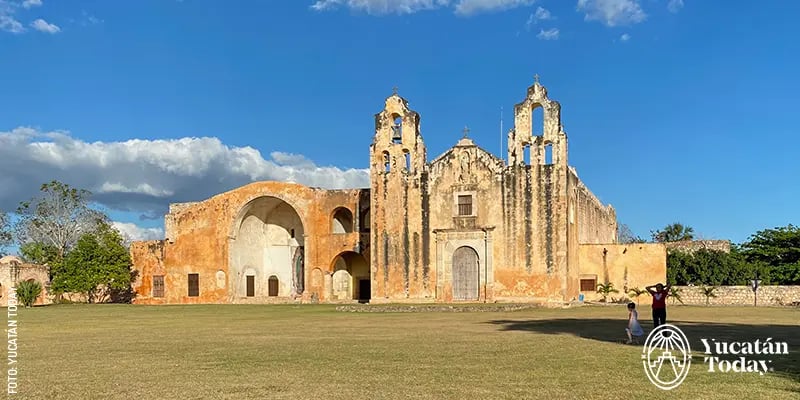
De los Pueblos Mágicos de Yucatán, ninguno dice “turismo cultural” como Maní, ubicado unos 90 km al sureste de Mérida. En Maní, historia, leyenda, artesanías y naturaleza se conjugan para crear una experiencia mágica.
El nombre de Maní significa “el lugar donde todo pasó”, ya que este pequeño poblado ha sido epicentro de varios hechos históricos destacables.
El Pueblo Mágico de Maní es perfecto para recorrer a pie; las distancias son cortas y las calles seguras para caminar. Visita el ex Convento, los meliponarios, las tiendas de bordados, la gruta y desde luego no te puedes perder de su muy famosa gastronomía.
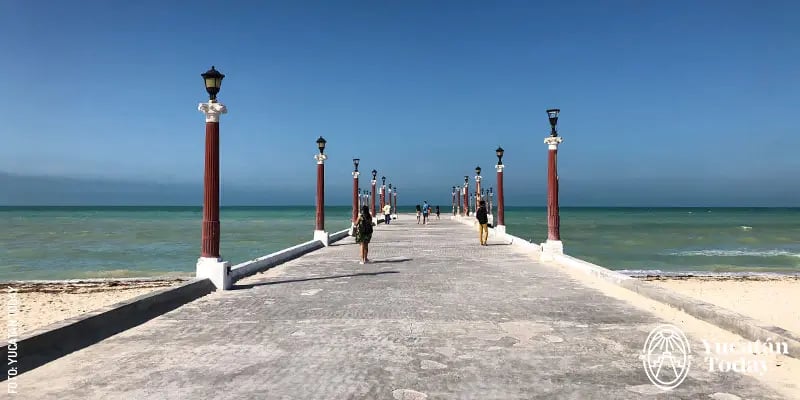
Sisal Pueblo Mágico de México en Yucatán
Todos los que visitan hablan maravillas de un almuerzo de mariscos frente a la playa, que es realmente agradable, sobre todo porque la playa es una de las más bonitas de la costa, con vastas extensiones de arena blanca y aguas tranquilas de color azul verdoso.
Además, en la plaza puedes encontrarte con unos cañones construidos en sus cimientos. También tiene un faro. El antiguo edificio de la Aduana es un museo. La otra cosa que se puede hacer en Sisal es visitar algunas de las atracciones naturales de la zona, como los manantiales de agua dulce, hacer un poco de observación de aves.
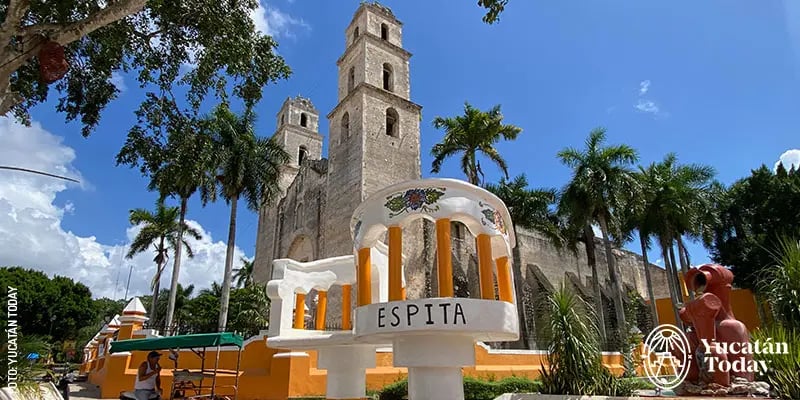
Ubicado a 162 km y aproximadamente a 2 horas en coche desde Mérida, el Pueblo Mágico de Espita está convenientemente cerca de Tizimín, Valladolid, Uayma, Chichén Itzá y localidades costeras como San Felipe, Río Lagartos y Las Coloradas, todos municipios cautivadores que vale la pena visitar.
Apodada la "Atenas de Yucatán" debido a su rica historia y su papel destacado como centro cultural en Yucatán, la villa de Espita es un remanso de tranquilidad y la capital del “turismo de descanso” en el sureste de México.
Un lugar muy tranquilo para disfrutar de la cotidianidad de la vida yucateca en los pueblos. Puedes tomar clases para aprender a hacer los platillos típicos de Espita como el Kot’sob o Xupik. Visitar la plaza por la noche los martes y jueves de vendimia de comida o concentrarte en tu descanso.
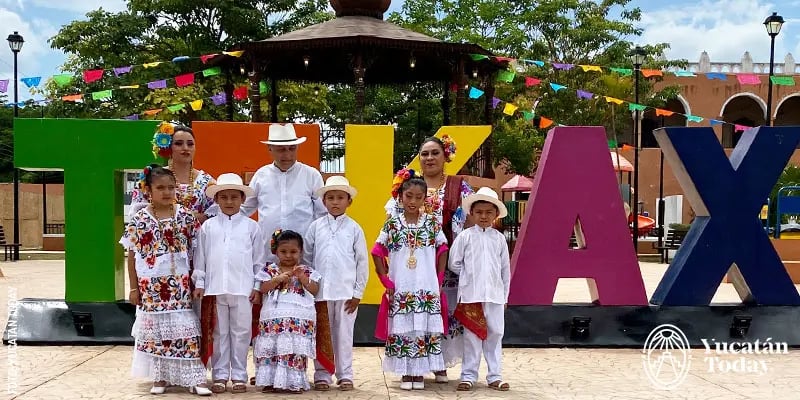
Tekax Pueblo Mágico de México en Yucatán
El municipio de Tekax o “la Sultana de la Sierra” se encuentra en el corazón de la reserva estatal biocultural del Puuc en el sur de Yucatán. Entre valles y cerros, este nuevo pueblo mágico ofrece una gran variedad de actividades familiares, para aventureros y amantes de la naturaleza.
Tekax, donde empieza el inframundo de las cavernas, Tekax te espera para vivir experiencias únicas y auténticas. Si te gusta el senderismo, la bajada en rapel, los circuitos off-road en bicicleta de montaña o cuatrimoto, o si prefieres el avistamiento de aves, la energía mística de la selva, Tekax es para ti, y para toda tu familia. Kalmakaal, Chocantes y Sartenejas son parques naturales con muchas opciones segun tu nivel de aventura. ¡Tu recorrido es muy fácil de personalizar!
En el pueblo podras visitar la iglesia San Juan Bautista, la segunda más grande de Yucatán después de la Catedral de Mérida. Date una vuelta por el callejón de los murales con sus 10 preciosos murales relatan la historia y la cultura del municipio, y son tan espectaculares que no podrás resistirte a tomarte cientos de fotos.
Visita la Ermita, la estrella de la Sultana de la Sierra. Puedes entrar a la capilla; ahí se encuentra San Diego de Alcalá, el santo custodio de la ciudad y los murales alusivos a sus milagros.
Completa tu aventura en Tekax en el extremo oriente de la región Puuc: la zona arqueológica de Chacmultún. Sus murales y juego de pelota son testigos de la importancia de la ciudad durante el periodo posclásico maya.
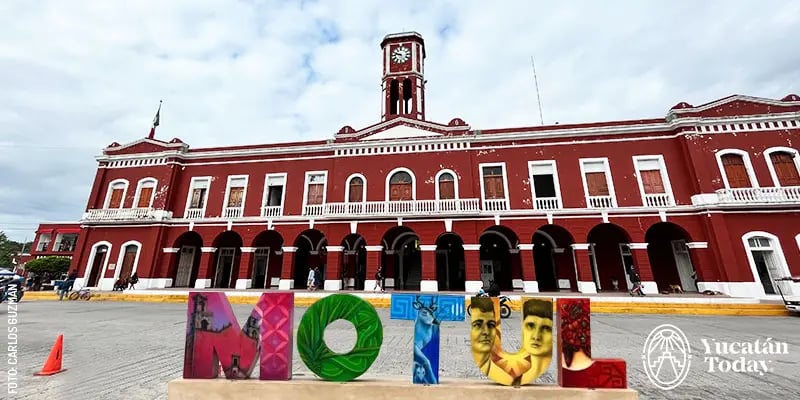
Motul Pueblo Mágico de México en Yucatán
A tan solo 30 minutos del Periférico de la ciudad de Mérida, llegarás a uno de los más recientemente nombrados Pueblos Mágicos de Yucatán. Motul de Carrillo Puerto (que ese es su nombre completo) es una ciudad rica en historia, gastronomía y otros atractivos que te invitan a descubrirla en un ambiente totalmente familiar.
Dentro de lo que debes conocer esta el desayuno auténtico y delicioso de Huevos Motuleños fritos en el local de “Doña Evelia”, en el mercado “20 de noviembre”, un lugar favorito de locales y visitantes.
Enfrente del mercado se encuentra el parque principal dedicado a Felipe Carrillo Puerto, destacado gobernador socialista de Yucatán oriundo de esta ciudad. A un costado del mercado, se ubica la casa donde nació y creció este personaje y que ahora alberga un museo que exhibe documentos, fotografías, cartas y objetos personales.
Pasando la plaza principal se encuentra la iglesia y exconvento de San Juan Bautista (1567), patrono de Motul.
Si decides refrescarte un poco, en la plaza principal puedes tomar un mototaxi y pedirle que te lleve al cenote Sambulá, un atractivo para locales y visitantes ubicado a unas 10 cuadras del centro.
Otros pueblos en Yucatán
Tixpéhual
Tixpéhual, en este pequeño pueblo vale la pena visitar el templo de San Martín Obispo, edificado en la época colonial. Observa con detenimiento las puntas de la iglesia que asemejan llamas. En el parque principal también encontrarás una escultura de Enrique Gottdiener Soto dedicada a la maternidad.
Cacalchén
En Cacalchén date una vuelta por el Palacio Municipal y el Templo de San Pedro y San Pablo que data del siglo XVI. Durante la última semana de junio, del 20 al 29, se realiza la fiesta anual en honor de ambos patronos del municipio, en la que participa toda la comunidad. En Semana Santa los habitantes de Cacalchén acostumbran ir por el Cristo de Aké, población cercana, y realizar un recorrido por las calles cargando la imagen, en agradecimiento por los milagros y bendiciones concedidas.
Recorriendo Cacalchén podrás apreciar las albarradas (muros muy característicos en los pueblos realizados con piedras) y bugambilias de varios colores saludándote al pasar. Pregunta por los cenotes abiertos al público y aptos para darse un chapuzón, como “Ayin” que se encuentra en la localidad dentro de una gruta semiabierta en la que podrás refrescarte. Para entrar se cobra $20 pesos.
Bokobá
Siguiendo aproximadamente unos 6 km por la carrerera está Bokobá, un poblado que te brindará sorpresas inesperadas como el Templo y ex Convento de la Virgen de la Asunción del siglo XVII, además de bancas hechas de granito en el parque principal, puertas de madera pintadas de colores diferentes y por supuesto no pueden faltar las bicicletas, principal medio de transporte.
Tekal de Venegas
Tekal de Venegas se encuentra a unos 30 km de Cacalchén y a 14 km de Izamal. Destacan los templos de San Román y San Pedro, pintados con el característico color amarillo y escalinatas principales. También puedes realizar actividades eco arqueológicas en Ox Watz que cuenta con edificaciones de una vieja hacienda henequenera, tres aguadas (Tzatz, Kanab y Ox Watz), la zona arqueológica X’Batún, el cenote Azul y Kukulá, así como actividades en bicicleta y observación de aves y árboles. Toda una experiencia.
Artículos relacionados
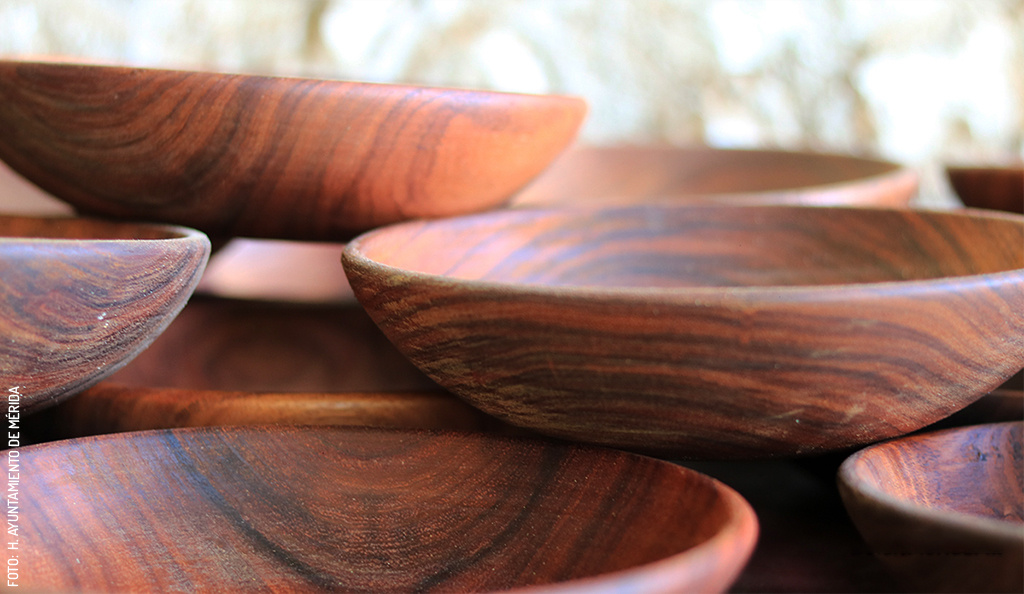
Llega la 23° edición de la Feria Artesanal Tunich 2024

Más que sólo cenas: Actividades nocturnas para hacer en Mérida
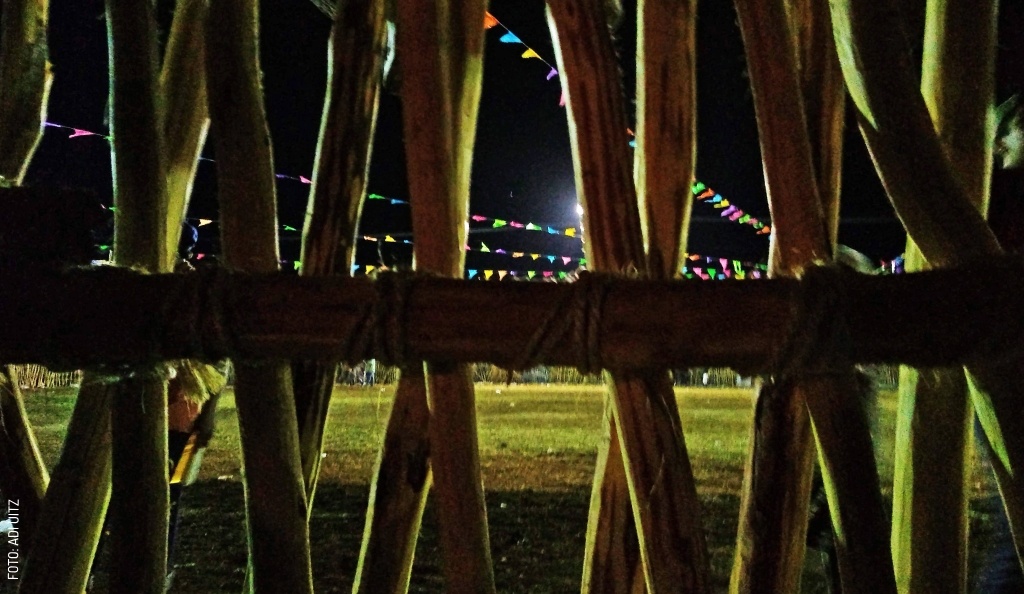
Los ruedos artesanales de Tixkokob, Yucatán
Artículos relacionados

Llega la 23° edición de la Feria Artesanal Tunich 2024

Más que sólo cenas: Actividades nocturnas para hacer en Mérida






